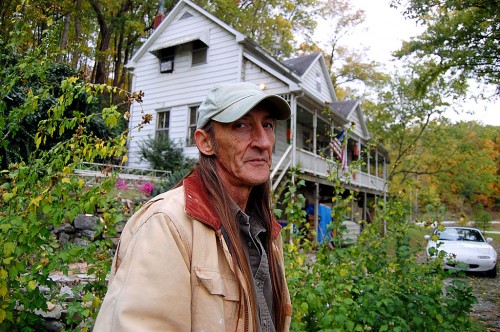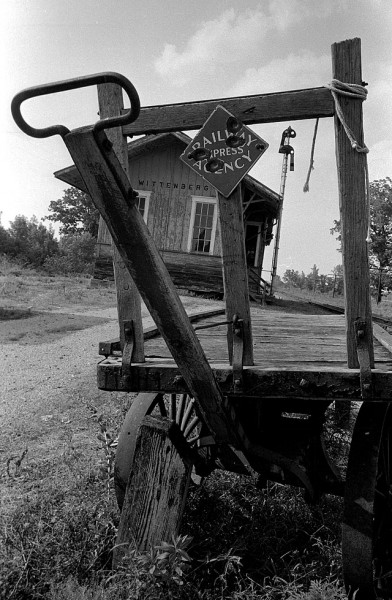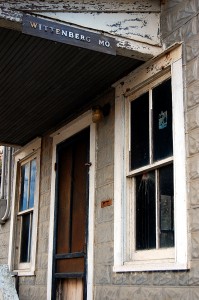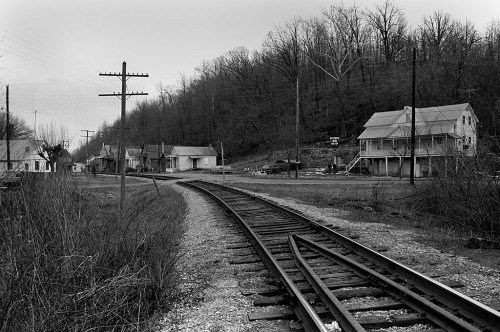 I’m not exactly sure what draws me back to Wittenberg on almost every trip to Cape. There’s not much to see. There are only two buildings and three people left in the town. David Holley is one of them. I knocked on his door to get permission to go into what was called the Wittenberg Bomb Shelter when I photographed it in 1966. I’ll have more photos and stories about the German community in the future.
I’m not exactly sure what draws me back to Wittenberg on almost every trip to Cape. There’s not much to see. There are only two buildings and three people left in the town. David Holley is one of them. I knocked on his door to get permission to go into what was called the Wittenberg Bomb Shelter when I photographed it in 1966. I’ll have more photos and stories about the German community in the future.
The last train robbery
While he was catching me up on what he knew about Wittenberg, he told me that what some folks call the last train robbery in the state – if not the whole country – took place just up the tracks from his house. Watch the video to hear his version of the story in his own words.
Last of the Jesse James Gang
 History’s a slippery thing. David has the general story straight, but some other accounts have the names and some minor details a little different. (He admits that he takes things he hears with a grain of salt.)
History’s a slippery thing. David has the general story straight, but some other accounts have the names and some minor details a little different. (He admits that he takes things he hears with a grain of salt.)
Here’s one that talks about the history of Seventy-Six, Mo., and the robbery.
In October, 1922 the St. Louis – San Francisco train was robbed two miles north of Wittenberg. Over $100,000 was taken before the robbers were shot at the little bridge in Wittenberg. One of the Robbers turned out to be Jack Kennedy, also known as “Quail Hunter” Kennedy, the last of the Jesse James gang.
 Jack Kennedy had become a member of the James gang at 17. Although frequently incarcerated over the years, he was never convicted of murder and always managed to win parole. He went weeks before the train robbery roaming the Frohna area, where he lived in the woods and plied a trade of knife and scissor sharpening. He knew that each fall money was sent from St. Louis banks to Memphis, Tennessee.
Jack Kennedy had become a member of the James gang at 17. Although frequently incarcerated over the years, he was never convicted of murder and always managed to win parole. He went weeks before the train robbery roaming the Frohna area, where he lived in the woods and plied a trade of knife and scissor sharpening. He knew that each fall money was sent from St. Louis banks to Memphis, Tennessee.
After determining the best location for a bank robbery would be between Seventy-Six and Wittenberg, he and his two accomplices board the train and put their plan into action. While on gunman held the passengers captive, another searched the mail bags and located the packages earmarked for a certain bank in Memphis. The train was then disconnected from the locomotive and a baggage car while Kennedy, with a young dark-haired accomplice, got on the locomotive and took off into the night.
Bad choice of accomplice
About 100 yards south of the Wittenberg bridge, the robbers, each carrying a mail bag, left the train after opening the engine throttle and sending the locomotive and baggage car onward. Unfortunately, Jack Kennedy made a judgment error in choosing his third accomplice. This accomplice, chosen by Jack Kennedy because he had a car – essential to the getaway plan, was to wait for Jack Kennedy and his on-board accomplice to complete the robbery. What Jack Kennedy didn’t know was the accomplice he had so carefully selected was a Federal Marshall.
On that October night, the conductor, engineer, and the firemen on the train were aware of the planned robbery. Expecting Kennedy to release the locomotive, they made sure the fire was burned down when the robbery occurred. Quickly running out of steam, the locomotive stopped just seven miles down the track. The bank robbers, thinking they had successfully gotten away with the robbery, were surprised after leaping from the train to hear voices shouting “Halt!” Jack Kennedy didn’t halt. Instead, he pulled his six-shooter out, and he and his young accomplice were shot dead. Their bodies were taken to Mr. P.J. Lueder’s studio, where they were propped up and photographed while onlookers gazed at the gory sight.
The young accomplice turned out to be Robert Ford, an Oklahoman who had idolized Jesse James and, in an effort to imitate him, couldn’t resist joining with Jack Kennedy when a chance meeting put them together.
Another version of the robbery
 While visiting the Altenburg Lutheran Heritage Center & Museum, I picked up a copy of the Perry County Historical Society’s book, Wittenberg, Perry County, Missouri.
While visiting the Altenburg Lutheran Heritage Center & Museum, I picked up a copy of the Perry County Historical Society’s book, Wittenberg, Perry County, Missouri.
It had an account of the robbery that said the young accomplice was Lawrence Logsdon of Memphis. When his parents came to claim his body, which had already been buried, they said he had never been away from home until three weeks prior to the shooting. He had a clean record before meeting up with Quail Hunter Kennedy.

I don’t remember ever hearing of the train robbery but I was always fascinated with the town of Seventy-Six. Daddy told us about it and took us there once. We thought of it as a ghost town.
So did you take some pics in the old beer cellar? I was there a couple of years ago and took a few — tough lighting situation, though.
http://www.flickr.com/photos/agathman/3069664084/
Allen,
Yep. I shot the cellars in the 60s and again last year. I used two strobes to light in the insides and have a couple of shots I like.
I’ll be running them, along with other photos from Altenburg and Wittenberg in the not-to-distant future.
BTW, I noticed that you had the gentleman in the top photo identified as David Haller in your flickr account. I played back a tape I made of him last night and he clearly (I hope) spelled it as Holley.
I, too, have a hard time keeping my burgs and bergs straight when I’m writing about Altenburg and Wittenberg. Thank goodness for customized spell checkers.
Thanks for the correction, Ken. You’re much more of a reporter than I — I didn’t even ask him to spell his name. I’m pretty sure I got his dog’s name right, though. http://www.flickr.com/photos/agathman/3069676170
In germany a town name ending with burg means the town is on a hill or ridge. Burg is used for a town on low ground or a valley
Altenburg is on the ridge, and Wittenberg is on the river.
Ken,
I was excited to see the article on Wittenberg, Mo. because that is where I was born. I recall some of the building as well as the house that was owned by Nick Lungwich (?) He owned and ran the ferry boat. I will be interested in see other pictures you have on Wittenberg.
You’ll definitely want to keep watching this space, then. I have a bunch of photos of the ferry. I may send you some to see if we’re talking about the same person.
Only two buildings and three people remaining, eh? I remember in the 1960s getting some jars of quite-tasty apple butter that was made there. That autumn festival was fairly well known, as I recall, a “destination event” for those who cared about such things. How long it continued after that I don’t know, but I still think about it every time I hear the name Wittenburg
Interesting. I live in Altenburg. Would like to know more about bygone the local historical events. Thanks.
Ralph,
I may be working on a project in your area this spring.
I’ll definitely be publishing more photos from around the German communities in Perry County.
Here are a couple from the Altenburg Museum:
Christmas trees
Vintage hats of Perry County
Good to see the photos of Wittenberg. My grandfather and great grandfather Arther and Joe Mueller had the
General Store in Wittenberg.
If the store was still there in 1966, I probably have a photo of it.
What a small world, Alice! My grandfather, Fred Walther, worked at your grandfather’s store when my father was young. They moved away when Dad was 7, in 1926.
I`ve worked on the railroad since 1975, been to wittenberg 100`s of times,also seventy-six.Very good article.
I never knew what / where Seventy-Six was until I was researching this story. Guess I’ll have to meander up there to see if anything is left.
My mother’s mailing address was Seventy-Six. Went there as a child, many years ago. Wasn’t much there even then. The main memory I have is of the bluff.
There’s not much left of Seventy-Six. I stopped there last fall.
My mother’s mailing address was Seventy-Six. Went there as a child. Not much left even then. The bluff is my main memory.
Ken,
You should talk to Ted Wilson, he lives on PCR 460 down by the river. He is in his 80’s and knows a great deal about the area. You should also read the book titled “My Farm on the Mississippi” by Henreich Hauser (not sure about the spelling) it’s a great history of the general area there. Loved reading about this train robbery. We love seeing these old pictures. My husband’s family had land down there when he was a kid and now we rent a little four acre place with the most awesome view of Tower Rock possible. We are building a little cabin there and plan to put pictures of Wittenberg on the walls there. We have a few of the town from way back when.
I make it to Tower Rock every time I come back, particularly in the fall. My mother loves the persimmons that grow at the overlook next to the tracks.
(I was disappointed to see one of them had been cut down when I was there the last time.)
I’m hoping to hook up with some of the former residents of Wittenberg to photograph them. I may come knocking on your door when I pass through there in April.
I am a Perry Co. Mo resident and visited Tower Rock today and what’s left of Wittenberg and know Seventy Six well from fishing trips. Thanks for sharing info about Wittenberg and info about book.
There is a book (Pictorial review)about early Wittenberg authored by Mary Dillon, Indianapolis, IN, E-mail contact
I am the author of the book, “Wittenberg In Touch With the Past”, and am pleased to find anything related to this historical town. My father, Orville Mueller, was born there. His father and grandfather owned a store which sat against the bluff and the quarry south of town near the silica pits. There was also a Mueller addition north of town which was named Frogtown because of an undertaking of two enterprising individuals who wanted to go into the business of raising frogs. There is nothing left of Seventy Six and I’m afraid Wittenberg is next in line for distinction. Hopefully we can keep this history alive by continuing to publish articles like this.
Mary,
Is your book a large, very well done hardback with lots of photos? If so, I had a chance to look at it when I stopped in at the museum in Altenburg. I’d have bought one, but the gift shop was out of copies.
I had brought along my laptop with my Perry County photos on it to see if I could get some help identifying them.
As I was leafing through the book, I commented that some of the aerial photos must have been taken at about the same time as mine because the shadows were similar.
Then, I said, pulling out my computer, “In fact, the photographer must have been sitting on my lap. The shot of that church has exactly the same cars parked around it as in my photo.”
Someone else was credited with the pictures. I meant to follow up with the author to see how they were obtained, but didn’t get around to it.
If this is the same book, perhaps we should talk.
My grandparents lived in Wittenberg when I was a child and I remember the town as it was in the 1940’s when the Frisco was still running passenger trains. I can still remember when the rock quarry south of town was working and there was a hugh old brick warehouse just to the north of Grandpa Hoehne’s house. My cousins and I would go to Nicks Place and drink soda and shoot pool when there was nothing else to do. I also remember there was a ferry boat that took cars across the river.
Ah yes, those were the days.
The ferry was still running when I shot the town in 1966ish.
Jerry’s Grandpa Joe Hoehne was my Great-Great Grandpa Hoehne. Joe Hoehne’s grandson, my Grandpa Joe Scholl, was born in Wittenberg a few houses down from the post office.
Ken,
The book is green and was sold at the Museum, however now I am the only source. I still have some Wittenberg books left (published in 2006). This book has about 500 photos.I have just finished writing a book mainly about Altenburg, but it also includes Frohna, Seelitz, Wittenberg, Uniontown and Old Appleton. This book (published 2011) contains over 1600 photographs. I would be pleased to talk to you. My email is: mary2075@sbcglobal.net
The check’s in the mail for your two books. Am looking forward to getting them.
Thanks Ken. Can’t wait to see what you project will be, anything written about the Altenburg/Wittenberg area will be fascinating.
My father grew up here, born in 1925. He has shared alot of these stories. His name is Clinton Telle.
He now lives in Altenburg but is going into a nursing home. There has always been something intriguing about
this town.
My grandmother grew up in Wittenberg. Her name was Mary Ann Tripp. She married my grandfather from Grand Tower, William Thomas ‘Tom’ Yow. They moved to Cape and that’s where they raised my father, Raymond W Yow, born in 1914. My great grandfather Louis Calvin ‘Cal’ Yow worked in the silica mine. I visited Grand Tower several years ago collecting genealogical info on my family. There are some Yows buried in the Walker Cemetery at Grand Tower. My great grandfather Cal Yow went blind at a young age, not because of the silica but because a doctor put the wrong drops in his eyes when they became irritated. Consequently, the family was extremely poor. He made what living he could chopping wood over by Grand Tower.There was no such thing as Social Security or welfare back then.
I’m glad that you’re still working on recording and publishing history and photos of the area. If you publish anything, please let me know.
Responding to Irene Walther- I have a picture of your father, Fred, standing on the porch of the Mueller store in Wittenberg. If you would like a copy, let me know.
Does anyone know of a Missouri Train Robbery in 1910? I have an ancestor, Charles Taylor, that reportedly was “Shot” off of a telegreph or telephone pole. during a train robbery in 1910. Charles Taylor was from Jefferson Co, MO. The story came from Chas son & who said his father died in 1910. The other story in the family was that Charles “worked” for the railroad & was killed during a robbery. If anyone can help out on this bit of Railroad history. That would be great.
I am currently working on a novel that incorporates some of Whitenberg into it. Of course, it is fiction, but I am very into keeping with the facts of a place that I write about. I can’t thank you enough for this article and all the comments. Made my research much easier!
I was born in Wittenberg, still have lots of relatives in the area. My cousin Mary Dillon’s books reminded me of sooo much of my childhood growing up,and the people that lived there. My gradfather Ray Murray (from Wittenberg) was a pilot on the towe boats that ran up and down the river from New Orleans to St Joe. My other grandfather Albert Mueller was postmaster of Alatenburg for over 50 yrs. THANK YOU MARY DILLON for helping me remember some things that i had forgotten. If anyone reading this remembers me, feel free to message me at bikerdon8@hotmail.com
Don, Thanks for all the credit, but I couldn’t have put those books together without the help of a lot of folks who took the time to relate their memories and share some of their pictures. I was fortunate to be able to speak to many older people, that was my favorite part of the research. I remember your grandfather, Ray, coming to BBQ’s when I was small. My Uncle, Harlan Mueller, was famous for his cook outs, all of Wittenberg would come. I also remember your grandfather’s old car that he treasured, though can’t remember the make.
Mary, you deserve a lot of credit for all the time and effert you put into these books. They helped me remember many thing about growing up and some people i had almost forgotten. Grampa Murray loved that old car (grama hated that old peice of junk 😛 )it was a 1908 Buick that he bought brand new when they were first married. He used to drive it in parade for the FAIR in Altenberg, still remember the rides he used to give us kids in it when he got it out once or twice a year 🙂 ..
Don, That is the car I remember. I can remember family entertainment when I was small – Dad would say, “you want to take a ride”. That was it, just a ride to nowhere. Big deal at the time.
I spent my summers in the 70’s with grandma & grandpa Grayson .
many times we climbed tower rock, or hung out at the sandbar just down from pipeline hill.
us kids used to as a right of passage , get on the old iron bridge in Wittenberg and ride the bounce as the freight trains would roll by 2 feet away and we were on the bridge .
Koby, did your family have a gas station on Hwy A as you entered Wittenberg?
My husband’s family ran the Birner Hotel. His great grandfather, Henry Birner, was a balcksmith and had his shop in the cave that was storage for the brewery.
My Grandpa Thompson used to make moonshine in that cellar
How long ago would that have been?
that was back in the 40s
Hey Ken, I know this is 13 years too late but I just found this article and wanted to chime in. Jack Kennedy is my great great grand-uncle. He lived & was born (1866ish) in Independence, MO (same area Jesse James lived around) with his Irish immigrant father and handful of siblings until he was 18 or so when he moved to Houston, TX to work the railroad. He was never a member of the James Gang, but always idolized Jesse and Frank. In the early 1890s Jack met Bill Ryan, a James Gang member fresh out of prison, and began his career as a train robber. Supposedly from California to Texas and back to Missouri he robbed close to 19 trains all together, more than Butch Cassidy, The James Gang, and the Dalton Gang combined. Only got caught once in 1899 and served 12 years in jail. Went 10 years without any known crimes except being implicated in a murder but never prosecuted, then died while trying to rob that train near Wittenberg on November 3rd, 1922 with 22 year old Lawrence Russel Logsden (the real name of Harvey Logan). They both are buried in Home Cemetery there in Perryville, MO in unmarked graves. I’ve never heard the name Robert Ford associated with this last robbery, and he’s certainly not buried next to Jack as I’ve spoken to the cemetery association recently to confirm his plot location and that of Logsden. There are alot of myths and legends surrounding Jack and his adventures and seeing as he is a somewhat forgotten historic figure, despite his record number of successful robberies, it is hard to separate truth from fiction. I’m currently writing my own book about Jack’s life and attempting to expand even further than Charles Rauh did with his book “The Last Train Robber”. Very glad to see folks still telling Jack’s story, even if it’s a bit fictionalized haha.
Thanks for filling in some history holes. Good luck with your book. Never let truth get in the way of a good story. Like my mother used to say, “My stories got better after everyone who could contradict me was dead.”